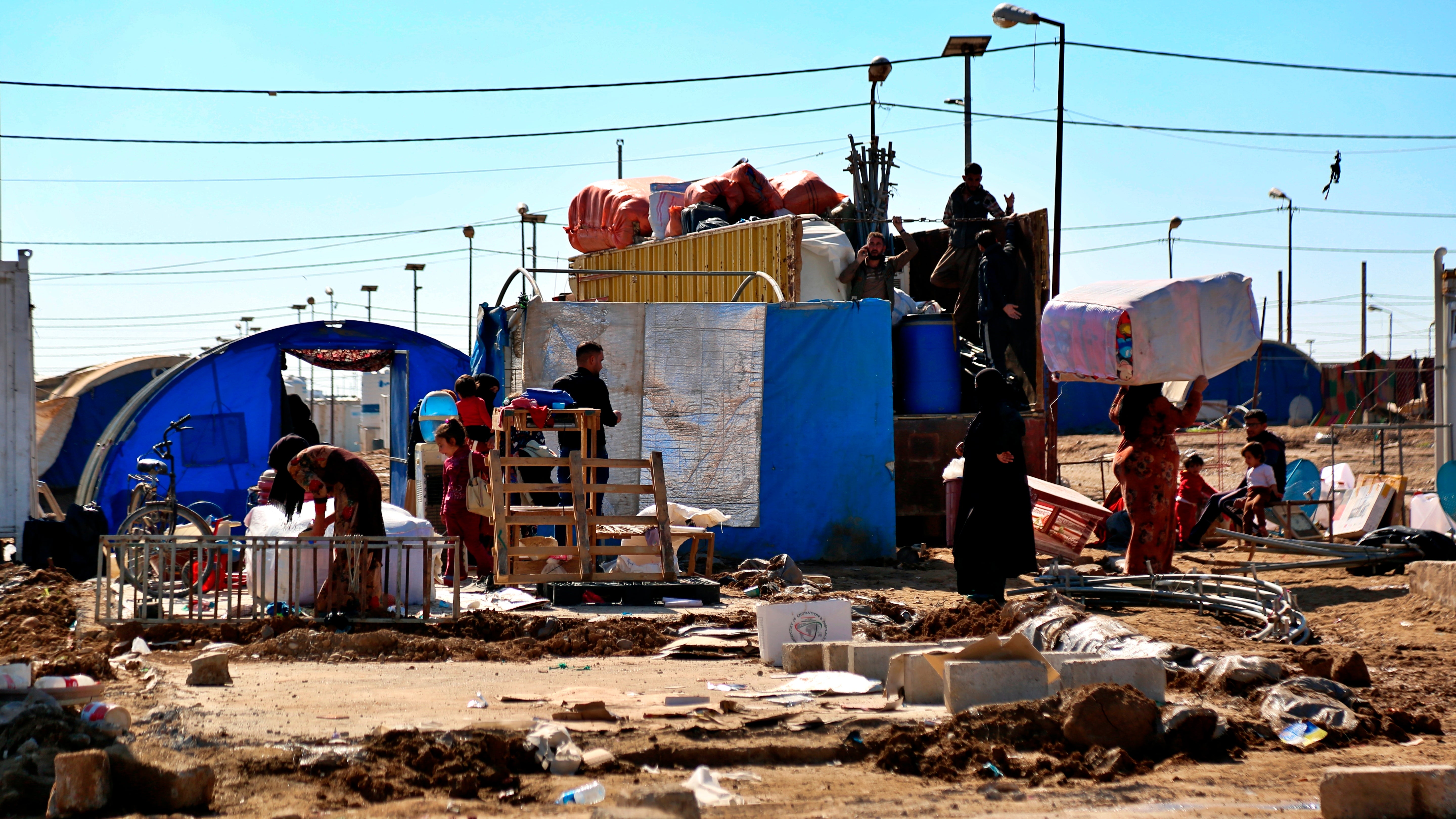Iraq sends mixed signals over closing camp for displaced
Iraq appears to have back-tracked on plans to close a camp for internally displaced Iraqis, many with links to the Islamic State group

Your support helps us to tell the story
From reproductive rights to climate change to Big Tech, The Independent is on the ground when the story is developing. Whether it's investigating the financials of Elon Musk's pro-Trump PAC or producing our latest documentary, 'The A Word', which shines a light on the American women fighting for reproductive rights, we know how important it is to parse out the facts from the messaging.
At such a critical moment in US history, we need reporters on the ground. Your donation allows us to keep sending journalists to speak to both sides of the story.
The Independent is trusted by Americans across the entire political spectrum. And unlike many other quality news outlets, we choose not to lock Americans out of our reporting and analysis with paywalls. We believe quality journalism should be available to everyone, paid for by those who can afford it.
Your support makes all the difference.Iraq appears to have back-tracked on plans to close a camp for internally displaced Iraqis, many with links to the Islamic State group, following a week of confusion and outcry from families unable to return home.
Evan Faeq Jabro, Iraq's minister of migration and displacement, told The Associated Press that the news the camp known as Jadah 5 in northern Iraq would close was false, and that it would remain open for the foreseeable future.
However, a letter issued by the ministry’s directorate in Ninevah province, addressed to its sub-districts and seen by the AP had said closures would begin on Jan. 25, suggesting the federal government subsequently reversed the decision, or that there was miscommunication within ministry ranks.
The mixed signals reflect Iraq's real dilemma as it races to close all camps for IDPs in line with its plans to revive lagging reconstruction efforts in many cases without providing alternative housing or properly managing reconciliation with local tribes.
News of the order had prompted criticism from many IDP families who said they felt forced to pack up and return to their destroyed, inhabitable homes. Some were subsequently sent back by vengeful tribes for their perceived links to IS.
“We were crying, we couldn’t sleep the night,” said a 37-year-old woman who identified herself as Umm Abdulrahman and whose husband was an IS member. She said her tribe in the town of Hawija rejects her family's return and that the camp is safer than her hometown. “If they force us to go back, we will stay in the street.”
Jabro, the minister, clarified that Jadah 5 would remain open for now, and dismissed news of the closure. She said families had the choice to stay, or failing government-led reconciliation efforts, would be provided housing elsewhere.
“It is still unknown until now when it will close, and maybe it will not close, because those who are living there still have problems with tribes, or their homes are completely destroyed,” she said in a phone interview.
“The ministry… didn’t announce we will close the camp and we were surprised too when we read the announcement” she said.
Iraq began accelerating camp closures late last year across the country, prompting condemnation from international aid groups who criticized the scheme as rushed. Many IDPs pitched tents next to their destroyed homes.
Families with proven or perceived links to IS are among the most vulnerable and heavily stigmatized in Iraqi society. They remain in camps, fearing reprisal from militias and tribes in their original villages.
Jadah 5, the last remaining camp in Ninevah, was expected to stay open to consolidate all these specific cases of IDPs and its closure would have disproportionately impacted them. It is not clear how many remain in the camp, which up until mid-January housed some 8,800 people.
At least four families interviewed this week in Jadah 5 said they had been told by Iraqi security forces to vacate the camp, first by Jan. 31, and then later, by the end of February. They rushed to pack their tents and piled up their belongings onto lorries, uncertain where to go next.
Khalil Mohammed, from the al-Zab area in Kirkuk, went back home despite receiving threats warning him against returning, but was kicked out by his neighbors who later destroyed his home. His son was an IS member.
“I tried to prevent my son from joining IS, but I couldn’t. Was it my fault,” he said.
The chaos ensued after a Jan. 21 letter, signed by the head of the migration ministry’s Ninevah department, ordered the closure of Jadah 5 to start on Monday, Jan. 25. The AP obtained a copy of the letter; two officials confirmed its authenticity.
Since the government's clarification, pressure to vacate the camps has abated but the confusion highlighted serious reconciliation challenges ahead.
Ahmed Khedir’s entire 120-member tribe cannot return to their home in Tal Afar, he said, because three among the family had belonged to IS.
“We can’t rent a home, we don’t have money. Sometimes we asked that God take our souls. We want to commit suicide because we can’t live in this country," he said.
___
Kullab reported from Baghdad.